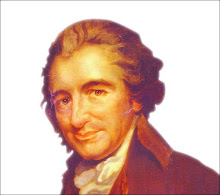"Gold and silver are the emissions of nature: paper is the emission of
art. The value of gold and silver is ascertained by the quantity which
nature has made in the earth. We cannot make that quantity more or
less than it is, and therefore the value being dependent upon the
quantity, depends not on man. Man has no share in making gold or
silver; all that his labors and ingenuity can accomplish is, to
collect it from the mine, refine it for use and give it an impression,
or stamp it into coin.
Its being stamped into coin adds considerably to its convenience but
nothing to its value. It has then no more value than it had before.
Its value is not in the impression but in itself. Take away the
impression and still the same value remains. Alter it as you will, or
expose it to any misfortune that can happen, still the value is not
diminished. It has a capacity to resist the accidents that destroy
other things. It has, therefore, all the requisite qualities that
money can have, and is a fit material to make money of — and nothing
which has not all those properties can be fit for the purpose of
money.
Paper, considered as a material whereof to make money, has none of the
requisite qualities in it. It is too plentiful, and too easily come
at. It can be had anywhere, and for a trifle.
There are two ways in which I shall consider paper.
The only proper use for paper, in the room of money, is to write
promissory notes and obligations of payment in specie upon. A piece of
paper, thus written and signed, is worth the sum it is given for, if
the person who gives it is able to pay it, because in this case, the
law will oblige him. But if he is worth nothing, the paper note is
worth nothing. The value, therefore, of such a note, is not in the
note itself, for that is but paper and promise, but in the man who is
obliged to redeem it with gold or silver.
Paper, circulating in this manner, and for this purpose, continually
points to the place and person where, and of whom, the money is to be
had, and at last finds its home; and, as it were, unlocks its master's
chest and pays the bearer.
But when an assembly undertakes to issue paper as money, the whole
system of safety and certainty is overturned, and property set afloat.
Paper notes given and taken between individuals as a promise of
payment is one thing, but paper issued by an assembly as money is
another thing. It is like putting an apparition in the place of a man;
it vanishes with looking at it, and nothing remains but the air."
Thomas Paine, Dissertations on government, the affairs of the bank, and paper money (1786).
Friday, May 20, 2011
Subscribe to:
Post Comments (Atom)




No comments:
Post a Comment
Keep it courteous and respectful, please.
Note: Only a member of this blog may post a comment.